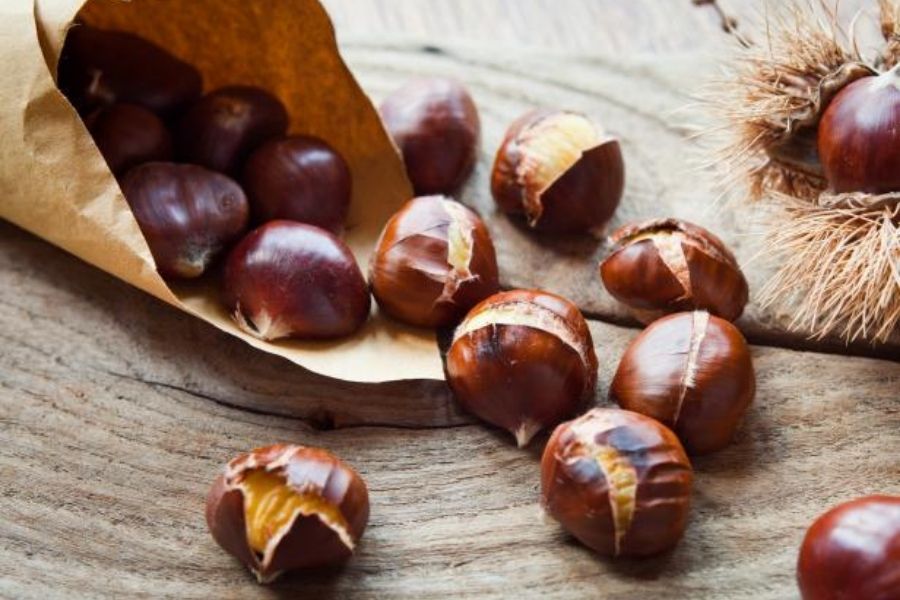Chestnuts have been a food source for thousands of years. They are very popular in the northern hemisphere because of their rich flavor and sweetness. There are several health benefits of chestnuts. They are abundant in vitamin C, complex carbohydrates, folic acid, fatty acids, low fat, and calories. They are quite appreciated for their characteristic taste. Chestnuts are excellent sources of vitamins and minerals like manganese, copper, magnesium, molybdenum, etc.
Chestnuts (Castanea Sativa in European scientific terms) grow on trees in the genus Castanea, and many species in this group can live for an impressive 500 years. They are particularly well known during the Christmas season. One can consume chestnuts raw, roasted, or even mixed with pastries. Chestnuts should not be confused with conkers that come from the Horse Chestnut tree as these are inedible or water chestnuts.
Nutrition Facts Of Chestnuts
For serving size: 1 ounce, roasted chestnuts contain
| Nutritients | Content |
|---|---|
| Carbohydrates (mainly complex carbs) | 15 g |
| Total fat | 0.6 g |
| Dietary fiber | 1.4 g (5%) |
| Natural sugar | 3 g |
| Protein | 0.9 g |
| Vitamin C | 12% DV |
| Vitamin B6 | 5% DV |
| Copper | 7% DV |
| Manganese | 17% DV |
| Potassium | 4% DV |
| Magnesium | 2% DV |
They contain 70 calories. Vitamin C is necessary for matrix formation in teeth, bones, and blood vessels. Copper helps form red blood cells. Potassium is good for people with hypokalemia. Magnesium has calming properties that help relieve stress.
Chestnuts, in general, also contain zinc, an essential antioxidant that helps prevent premature aging due to oxidative damage. It contains calcium responsible for build strong bones and teeth, make sure our blood clots properly, and iron, which is important for making new red blood cells.
10 Health Benefits Of Chestnuts
1. Chestnuts Are Good For Digestion

Chestnuts have high dietary fiber content, making them beneficial for improving the function of the gastrointestinal system. Studies have shown that soluble and insoluble fibers increase stool frequency, stool weight, and bulk. A 3-ounce serving of roasted chestnuts has 4 g of fiber.
2. Chestnuts Help In Weight Loss

Chestnuts might help in weight loss as it keeps you full and satiated for a long duration with fewer calories. It resists you from the urge to have food frequently. Chestnuts further help in regulating the bowel moments properly that promotes a healthy body weight.
3. Chestnuts Have Antioxidant Property

Chestnuts contain nutrients that possess antioxidant properties. Free radicals are responsible for oxidative damage in the body’s cells and are linked with the development of several deadly diseases.
4. They Contain Complex Carbs

Chestnuts contain complex carbohydrates that are high in content. Your body digests these complex carbs slowly for a stable energy source. Complex carbohydrates are not responsible for increasing blood sugar like simple carbohydrates because the fiber content is high; it does not trigger diabetes or cardiovascular diseases.
5. Chestnut Are Rich In Important Nutrients

Chestnuts are rich in vitamins A and C, both of which are strong antioxidant agents that fight the damaging effects of free radicals in the body’s tissues. Vitamin C in chestnuts supports the formation of blood vessels, muscle, and collagen throughout your body. Vitamin C aids in iron absorption. Phenolic acids like ellagic and gallic acids are found in abundance in chestnuts and have shown that they display potent antioxidant activities.
6. Chestnuts Contain Tannins

Chestnuts contain tannins important in scavenging the free radicals, preventing oxidative damage, and inhibiting DNA sequences’ permanent mutation, leading to complications. Tannins have antioxidant, anti-cancer, anti-inflammatory properties that help to keep the body healthy.
7. Help In Prevention And Management Of Diabetes

Chestnuts contain the mineral magnesium, which plays an important role in the secretion of insulin. Its deficiency causes insulin sensitivity and also increases the chance of the individual developing insulin resistance. But, for diabetic patients, moderation is the key to health. ALWAYS CONSULT YOUR DOCTOR IF YOU ARE DIABETIC BEFORE CONSUMING ANY NEW FOOD.
8. Contain Fat-soluble B Vitamins

Chestnuts contain fat-soluble B vitamins that promote healthy skin, produce red blood cells, and improve brain function. Chestnuts have a generous blend of B vitamins in moderately high amounts. A 3-ounce serving contains 20% of the recommended daily value of B6, 15% of folate, 14% of thiamine, and 9% of riboflavin or vitamin B2.
9. Help Prevent And Manage Cardiovascular Diseases

Chestnuts are a great source of calcium, which helps in the prevention and treatment of cardiovascular diseases. A study found that dietary intake of calcium or its supplements can reduce the mortality rate caused by ischemic heart disease in post-menopausal women. Antioxidants like potassium and magnesium help reduce heart stroke.
10. Chestnuts Are Gluten-free

Chestnuts are gluten-free food items that have healthy nutrients present in them, as mentioned above. They are one of the popular ingredients used to prepare gluten-free food formulas intended for gluten-sensitive, wheat allergy patients.
How To Store Chestnuts?
Chestnuts are more like vegetables and fruits when it comes to storing them. Once you buy it and then bring it home, try to pack them in a perforated bag and place them in the refrigerator by setting them at high relative humidity where they remain fresh for several weeks.
How To Consume Chestnuts?

Chestnuts can be fried or roasted, or even boiled in the oven. They can be consumed as so-called chestnut kebab or roasted chestnut. Chestnuts can be used in dessert preparations, rice, and food or serve as a dessert-like Maroni candied chestnut.
Chestnuts are also used to make the mash. Chestnut bread can be prepared with powdered chestnut. As chestnut flour does not contain gluten, it is a nutritious flour that Coeliac patients easily use or gluten-sensitive patients.
Read also – 10 Essential Tips For A Healthy Diet Plan







